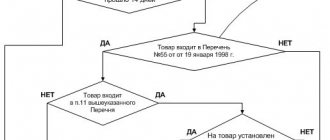Which court should I go to?
Claims for the protection of consumer rights (Article 17 of the Law “On the Protection of Consumer Rights”) may be brought, at the choice of the plaintiff, to the court at the place of: residence or stay of the plaintiff; location of the organization, and if the defendant is an individual entrepreneur, his residence; conclusion or execution of a contract. If a claim against an organization arises from the activities of its branch or representative office, it may be brought to court at the location of its branch or representative office. The exception is claims against carriers arising from contracts for the carriage of goods, passengers and their luggage, which must be filed in court at the location of the carrier against whom the claim was made in the prescribed manner.
How to resolve the issue pre-trial
Any information that pre-trial protection of consumer rights is mandatory is only partly true. The Law “On the Protection of Consumer Rights” adopted in Russia does not provide for mandatory out-of-court settlement of disputes arising with the seller. The exception to this are two situations: when it comes to a dispute with a telecom operator or with a carrier, including regarding the transportation of baggage or cargo. In these situations, you first need to try to resolve the issue out of court; in other cases, the consumer has the right to file a statement of claim in court.
In practice, it is better to first try to resolve the issue with the seller of goods or services, without resorting to the help of a court. Most Russian companies protect their reputation and try to meet the consumer halfway by finding a compromise solution, but within the framework of current legislation.
How to write a complaint
To launch a mechanism for solving the problem out of court, you need to file a pre-trial claim for the protection of consumer rights. The document does not have a strictly established form, but it must contain the following information:
- data of the addressee and contacts of the applicant indicated in the header of the claim;
- a detailed description of the purchased product or service provided, regarding the quality of which there was dissatisfaction;
- date of purchase of goods (provision of services), cost;
- the essence of the claim in free form;
- requirements for the seller, taking into account current legislation (it may be mentioned that in case of refusal to satisfy the requirements, the consumer reserves the right to appeal to the court or Rospotrebnadzor);
- listing of documents if they are sent along with the claim (warranty card, check, etc.).
You can download sample claims on the Rospotrebnadzor website, but it is better to entrust this issue to a lawyer who can state the essence of the claim as accurately as possible and confirm their legality with appropriate references to the laws.
Pre-trial procedure for protecting consumer rights
The claim is drawn up in two copies. The first document is sent to the head of the organization where the consumer was served. This can be done by leaving the document with the seller, secretary or other authorized person. On the second claim, the employee must put a date of receipt and signature, as well as certify it with a seal. The second copy remains in the hands of the consumer. If an employee refuses to accept a claim, it must be sent by registered mail with notification to the head of the organization.
The claim is reviewed by the company's management and must receive a response in writing within ten days. The document must contain information about whether the consumer's requirements will be satisfied and, if so, in what form. The seller is responsible for refusing to satisfy a claim; this is provided for in the “On the Protection of Consumer Rights”.
If the seller refuses to satisfy the consumer’s requirements or the option offered by the company does not suit the buyer, you can safely file a claim in court. The same reaction should occur if the claim has not been considered within ten days and the consumer has not received an appropriate written response.
Most often, it is beneficial for the consumer to resolve the dispute out of court. Consult with a lawyer to understand how high the chance of achieving the desired result is and how best to proceed. Our specialists will draw up a claim and tell you where to go if the answer is unsatisfactory.
How to file a claim in court?
To begin with, it is advisable to contact a consumer rights protection specialist, a lawyer, to draw up a competent statement of claim. You can do this yourself, but with references to laws and other regulatory legal acts that justify your requirements. It is necessary to make copies of documents in 2 copies for the court and the defendant. Documents must relate to the substance of the claim (checks, receipts, expert opinions, correspondence with the defendant, etc.). Before filing a claim in court, it is necessary to find out whether the dispute falls within the competence of this court. The competence of justices of the peace includes cases of property disputes where the value of the claim does not exceed one hundred thousand rubles. If the value of the claim exceeds one hundred thousand rubles, the case is subject to the jurisdiction of the district court.
You need to find out the judge's visiting days and come on the specified day or send a statement of claim by mail (by registered mail with acknowledgment of delivery). Please note that the judge does not give consultations and will not help you in drawing up a statement of claim, so you must go to the appointment with the judge with a ready-made package of documents. The judge, within five days from the date of receipt of the statement of claim in court, is obliged to consider the issue of its acceptance for court proceedings. After which, the judge issues a ruling, on the basis of which a civil case is initiated in the court of first instance. After accepting the application, the judge makes a ruling on preparing the case for trial and indicates the actions that the parties need to take. Attention! Plaintiffs in claims related to violation of consumer rights are exempt from paying state fees.
Sample statement of claim for consumer protection
To the Volzhsky District Court of the Samara Region,
443051, Samara, st. Puteyskaya, 29 Tel.: (846) [email protected]
Plaintiff: FULL NAME1, residing at:
Defendant: NAME1
Price of the claim: 199,980 (one hundred ninety-nine thousand nine hundred and eighty) rubles.
STATEMENT OF CLAIM
on consumer protection
On 06/05/2017, between NAME1, represented by the General Director, and me, FULL NAME1, a subscription agreement was concluded for the provision of VIP-Assistanse services (BlackEdition+ Program) No. BE-SJNFBNJ10U1040005, the contract period is 36 months, worth 99,990 rubles 00 kopecks (ninety-nine thousand nine hundred ninety rubles zero kopecks).
Payment was made from credit funds received under consumer loan agreement No. 36-00-112461-DPAB dated June 05, 2017 with PJSC Plus Bank.
Not wanting to use the services of the VIP-Assistanse subscription agreement (“BlackEdition+” Program) No. BE-SJNFBNJ10U1040005, on July 8, 2021, I sent a statement to the defendant in which I reported this circumstance and demanded the return of the money paid. The defendant appeared for the said letter on September 08, 2021, almost three months after the first unsuccessful attempt at delivery (July 16, 2021).
In accordance with Part 1 of Article 782 of the Civil Code of the Russian Federation, the customer has the right to refuse to execute a contract for the provision of services for a fee, subject to payment to the contractor for the expenses actually incurred by him.
A similar provision is provided for in clause 6.2 of the subscription agreement for the provision of VIP-Assistanse services (Program “BlackEdition+”) No. BE-SJNFBNJ10U1040005, according to which the customer has the right to refuse to fulfill this agreement unilaterally at any time, having made all payments with the contractor, related to the fulfillment of obligations under this agreement.
Article 32 of the Law of the Russian Federation “On the Protection of Consumer Rights” determines that the consumer has the right to refuse to fulfill the contract for the performance of work (rendering services) at any time, subject to payment to the contractor for the expenses actually incurred by him related to the fulfillment of obligations under this contract.
In accordance with paragraph 1 of Art. 31 of the Law “On the Protection of Consumer Rights”, consumer demands for the return of the amount of money paid for work (service) must be satisfied within ten days from the date of presentation of the corresponding demand.
In accordance with paragraph 3 of Art. 31 of the Law “On the Protection of Consumer Rights”, for violation of the deadlines for satisfying individual consumer demands provided for in this article, the contractor pays the consumer a penalty (penalty) for each day of delay, the amount and procedure for calculating it are determined in accordance with paragraph 5 of Article 28 of this Law.
In accordance with paragraph 5 of Article 28 of the Law “On the Protection of Consumer Rights”, in case of violation of the established deadlines for the completion of work (provision of a service) or new deadlines assigned by the consumer on the basis of paragraph 1 of this article, the contractor pays the consumer for each day (hour, if the period is determined in hours ) late fees (fine) in the amount of three percent of the price of performing the work (rendering the service)
, and if the price for performing work (rendering a service) is not determined by the contract for performing work (rendering services) - the total price of the order. The agreement on the performance of work (provision of services) between the consumer and the contractor may establish a higher amount of the penalty (penalty).
In my statement to the defendant, I asked to terminate the subscription agreement for the provision of VIP-Assistanse services (BlackEdition+ Program) No. BE-SJNFBNJ10U1040005 dated 06/05/2017 and to voluntarily transfer funds in the amount of 99,990 (ninety-nine thousand nine hundred ninety rubles zero kopecks) within 10 days to my bank account.
I warned the defendant that if he refuses to terminate the subscription agreement for the provision of VIP-Assistanse services (Program “BlackEdition+”) No. BE-SJNFBNJ10U104005 dated 06/05/2017 and voluntarily return the funds, I will be forced to go to court with a claim for the return of funds that in this case the defendant will also be charged court costs for legal services, execution of a power of attorney, and payment of state fees.
To date, I have not received either a written response or funds.
I regard your failure to receive a response to the claim within the prescribed period as a refusal by the defendant to voluntarily satisfy the consumer’s demands.
Considering the fact that a higher amount of the penalty is not established by the agreement of the parties, the penalty that is established by clause 5 of Article 28 of the Law “On Protection of Consumer Rights” is subject to application.
Considering the receipt of the letter on September 08, 2021, the ten-day period for refund expired on September 18, 2021.
From the specified date to November 30, 2021, the period of delay was 84 days, the cost of services under the contract was 99,990 rubles 00 kopecks (ninety-nine thousand nine hundred ninety rubles zero kopecks), thus the amount of the penalty is 99,990 / 100 * 3 * 84 = 251,974, 80 rubles, however, taking into account the restrictions established by law, the maximum amount of the penalty is 99,990 rubles 00 kopecks (ninety-nine thousand nine hundred ninety rubles zero kopecks).
In connection with the above and in accordance with paragraph 1 of Art. 31, paragraph 1, art. 28 and paragraph 1.4 of Art. 29, Article 32 of the Law “On Protection of Consumer Rights”, Part 1 of Article 782 of the Civil Code of the Russian Federation
I ask the court:
To collect from NAME1 99,990 rubles 00 kopecks (ninety-nine thousand nine hundred ninety rubles zero kopecks) as a refund of the amount of money paid for the service, 99,990 rubles 00 kopecks (ninety-nine thousand nine hundred ninety rubles zero kopecks) - a penalty for failure to fulfill the consumer’s request for a return the amount paid for the service, in total - 199,980 (one hundred ninety-nine thousand nine hundred eighty) rubles.
Exempt the plaintiff from paying state fees as a consumer.
Accept the claim for consideration by the court at the consumer’s place of residence.
Applications:
How to behave at a court hearing?
When judges enter the courtroom, everyone present in the courtroom stands up. The announcement of the court decision, as well as the announcement of the court ruling, which ends the case without making a decision, is heard by all those present in the courtroom standing. Participants in the trial address the judges with the words: “Dear Court!”, and they give their testimony and explanations while standing. Deviations from this rule may be permitted with the permission of the presiding officer. The trial takes place in conditions that ensure proper order in the court hearing and the safety of the participants in the process. The proper order in a court hearing should not be interfered with by the actions of citizens present in the courtroom and taking photographs and video recordings permitted by the court, and broadcasting the court hearing on radio and television. These actions must be carried out at places in the courtroom indicated by the court and, taking into account the opinions of the persons participating in the case, may be limited by the court in time. Participants in the process and all citizens present in the courtroom are obliged to comply with the established order at the court hearing.
What rights do persons participating in a court hearing have?
Persons participating in the case have the right to familiarize themselves with the case materials, make extracts from them, make copies, file challenges, present evidence and participate in their study, ask questions to other persons participating in the case, witnesses, experts and specialists; file petitions, including requests for evidence; give explanations to the court orally and in writing; present your arguments on all issues arising during the trial, object to the requests and arguments of other persons participating in the case; appeal court decisions and use other procedural rights provided by the legislation on civil proceedings. Persons participating in the case must conscientiously use all their procedural rights. The consumer has the right to conduct his affairs in court personally or through representatives (lawyer, lawyer, etc.). The representative has the right to perform all procedural actions on behalf of the represented person.
How long does it take to consider and resolve civil cases?
Civil cases are considered and resolved by the court before the expiration of two months from the date of receipt of the application to the court, and by the magistrate before the expiration of a month from the date of acceptance of the application for proceedings. Cases regarding reinstatement at work and collection of alimony are considered and resolved before the end of the month. Federal laws may establish shortened deadlines for consideration and resolution of certain categories of civil cases. In practice, the consideration of the case is usually delayed for many months (due to the examination and other circumstances).
How is a court decision made?
The decision of the court of first instance, in which the case is resolved on its merits, is adopted in the name of the Russian Federation in the form of a court decision. The court decision is made in a deliberation room, where only the judge hearing the case or judges who are members of the court in the case can be present. The presence of other persons in the first deliberation room is not allowed. Judges cannot disclose opinions expressed during the meeting. The court's decision is made after the trial of the case.
The court decision consists of introductory, descriptive, motivational and operative parts. The operative part of the court decision must contain the court's conclusions on the satisfaction of the claim or on the refusal to satisfy the claim in whole or in part, an indication of the distribution of legal costs, the deadline and procedure for appealing the court decision. The reasons for the court decision must indicate the circumstances of the case established by the court: the evidence on which the court's conclusions about these circumstances are based; reasons why the court rejects certain evidence; laws that guided the court. Drawing up a reasoned court decision may be postponed for a period of no more than five days from the date of completion of the case. The operative part of the court decision is announced at the same court session in which the trial of the case ended. When announcing only the operative part of a court decision, the presiding judge is obliged to explain when the persons participating in the case and their representatives can familiarize themselves with the reasoned court decision.
Jurisdiction at the choice of the consumer
As a general rule, a statement of claim is filed at the location of the defendant, but the consumer is given the opportunity to choose the most convenient place for him to file a claim for the protection of consumer rights (Part 7, Article 29 of the Code of Civil Procedure of the Russian Federation):
- At the location of the defendant. In this case, the location of an organization or individual entrepreneur should be understood as its legal address (i.e. not the address of an office or store, but the address specified during registration) - Art. 54 of the Civil Code of the Russian Federation.
- At the place of conclusion or execution of the contract. This could be the address of the store where the product was purchased or the salon where the service was provided.
- At the plaintiff's place of residence. Usually this refers to the plaintiff’s registered address, but if he actually permanently resides in another place, he can file a claim at the place of his actual residence.
Important! Executing companies often include in the service agreement a condition on jurisdiction of a specific court (the so-called contractual jurisdiction), which may be inconvenient for the consumer to contact. This condition of the contract does not deprive the consumer of the right to choose the place where the dispute will be resolved; however, the claim will have to include a requirement to recognize the contract in terms of establishing jurisdiction as invalid.
However, there is one exception to this rule: if a class action is filed, you can only go to court at the location of the defendant (Part 4, Article 30 of the Code of Civil Procedure of the Russian Federation).
Based on one of the above addresses, you can find a suitable court:
- The court district of the magistrate can be found in the State Automated System “Justice” database;
- There is usually one district court per administrative-territorial unit: city district, regional district, etc. In some regions you can find interdistrict courts.
To determine whether to go to a district or magistrate court, you need to focus on the cost of the claim and the stated requirements.




